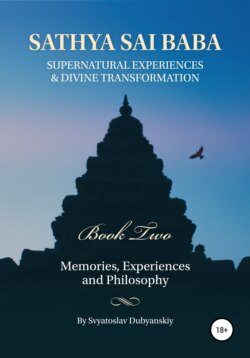Читать книгу Sathya Sai Baba. Supernatural Experiences and Divine Transformation. Book Two - Святослав Дубянский - Страница 6
5. All people are enlightened, they just don't know about it
ОглавлениеThe true "I" is always in awareness. All living beings experience the True Self as the awareness of "I Am". When the sense of self is misidentified with the body or mind, it becomes selfishness. Delusions of the mind cloud the True Self. It is like the clouds blocking the radiance of the sun. In the same way, the mind blocks the radiance of the True Self. The mind is unable to know the True Self, the mind is also unable to experience the supreme bliss of the True Self. One who has gained self-realization can be conscious under any circumstances of life.
(Sathya Sai Baba – "Summer Showers in Brindavan", 1990)
"I" is the original true name of God. God is the True "I" of every person and in general of every living being. "I" and God are eternally one, which is why it is written in the Vedas that everyone can realize that “I AM God.” The Gospel says: "I and my Heavenly Father are one." These aphorisms speak of the inner reality not only of the prophets and teachers, but of the essence of the soul of every person. This is the essence of Gnostics, that is, mystical Christianity.
By carefully studying the gospel message, we see that Jesus taught three basic doctrines. First, the realization of one's divinity. Second, direct communication between man and God. Third, love and compassion for one's neighbor. Jesus pointed out that God and the Kingdom of Heaven are the inner reality of every person.
The message of Krishna, Jesus and Sathya Sai Baba are identical and point to the inner divinity of each person, to the direct communication of man and God, and to the importance of serving people. At a higher level of spiritual practice, one discovers the truth that "I and My Heavenly Father are one." At this level, the communication between man and God becomes the communication between the Absolute "I" and the individual "I", which takes place in the depths of the Spiritual Heart.
The true "I" is originally enlightened and perfect; it does not need enlightenment, because enlightenment is its nature. As a person feels himself as a separate being, he strives for enlightenment as the final liberation from suffering. Realizing the true nature of his soul, a person opens the great treasure that is hidden in the Spiritual Heart.
For many years, the Buddha aspired to enlightenment, and having received this state, he was surprised to say that it turned out he had always been enlightened. However, the Buddha and many Masters, having gained enlightenment, utter wonderful words that all enlightened people simply do not know about it.
"I Am" is the door to higher reality. The beginning of the spiritual path lies in the awareness of one's existence, i.e., "I Am". At first glance, this sounds too elementary and obvious, but most people are not aware of their existence – most live their entire lives in unconsciousness. Self-existence is a well-known sensation for every person; it is so familiar that it often goes unnoticed. The feeling of "I Am" is the door to the highest reality and it is from this knowledge that the true spiritual path begins.
You are what you think you are. You are inherently free, so no one can give or take away your freedom. Remember that the information you are given may be true for some, but it is not necessarily true for all. You have the right to accept or reject any point of view, regardless of the authority of the person who tells you something. You are what you think you are so, be aware of your freedom.
The divine man is free and of good morals. Freedom alone is not enough. Freedom in ignorant hands can cause grief and suffering. The freedom of the wise is based on good. You are free because you always have the freedom to choose, even if you may not always understand it. The freedom of choice in the life of a wise man is based on love. The freedom of the unreasonable is based on selfishness.
The Buddha told his disciples they could only accept his teaching if they agreed with it after thinking deeply about the essence of the teaching. This was a manifestation of true freedom. Sathya Sai Baba also never demanded thoughtless submission. He left people with the right to free choice and the right to learn from their mistakes.
